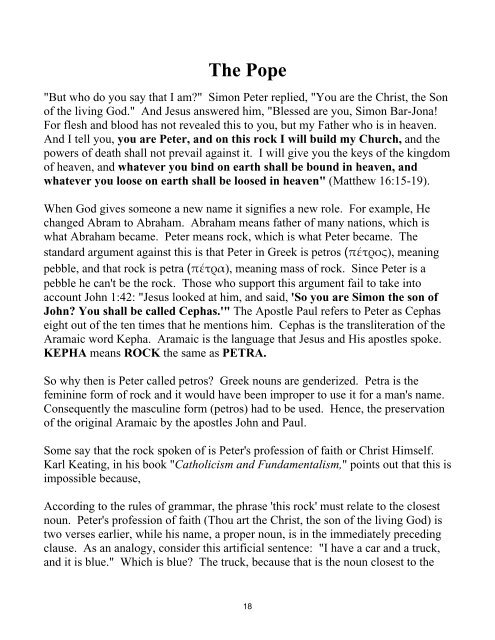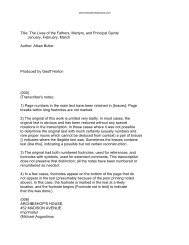Sebastian R. Fama - St. Patrick's Basilica
Sebastian R. Fama - St. Patrick's Basilica
Sebastian R. Fama - St. Patrick's Basilica
You also want an ePaper? Increase the reach of your titles
YUMPU automatically turns print PDFs into web optimized ePapers that Google loves.
The Pope<br />
"But who do you say that I am?" Simon Peter replied, "You are the Christ, the Son<br />
of the living God." And Jesus answered him, "Blessed are you, Simon Bar-Jona!<br />
For flesh and blood has not revealed this to you, but my Father who is in heaven.<br />
And I tell you, you are Peter, and on this rock I will build my Church, and the<br />
powers of death shall not prevail against it. I will give you the keys of the kingdom<br />
of heaven, and whatever you bind on earth shall be bound in heaven, and<br />
whatever you loose on earth shall be loosed in heaven" (Matthew 16:15-19).<br />
When God gives someone a new name it signifies a new role. For example, He<br />
changed Abram to Abraham. Abraham means father of many nations, which is<br />
what Abraham became. Peter means rock, which is what Peter became. The<br />
standard argument against this is that Peter in Greek is petros (πέτρος), meaning<br />
pebble, and that rock is petra (πέτρα,meaning mass of rock. Since Peter is a<br />
pebble he can't be the rock. Those who support this argument fail to take into<br />
account John 1:42: "Jesus looked at him, and said, 'So you are Simon the son of<br />
John? You shall be called Cephas.'" The Apostle Paul refers to Peter as Cephas<br />
eight out of the ten times that he mentions him. Cephas is the transliteration of the<br />
Aramaic word Kepha. Aramaic is the language that Jesus and His apostles spoke.<br />
KEPHA means ROCK the same as PETRA.<br />
So why then is Peter called petros? Greek nouns are genderized. Petra is the<br />
feminine form of rock and it would have been improper to use it for a man's name.<br />
Consequently the masculine form (petros) had to be used. Hence, the preservation<br />
of the original Aramaic by the apostles John and Paul.<br />
Some say that the rock spoken of is Peter's profession of faith or Christ Himself.<br />
Karl Keating, in his book "Catholicism and Fundamentalism," points out that this is<br />
impossible because,<br />
According to the rules of grammar, the phrase 'this rock' must relate to the closest<br />
noun. Peter's profession of faith (Thou art the Christ, the son of the living God) is<br />
two verses earlier, while his name, a proper noun, is in the immediately preceding<br />
clause. As an analogy, consider this artificial sentence: "I have a car and a truck,<br />
and it is blue." Which is blue? The truck, because that is the noun closest to the<br />
18






